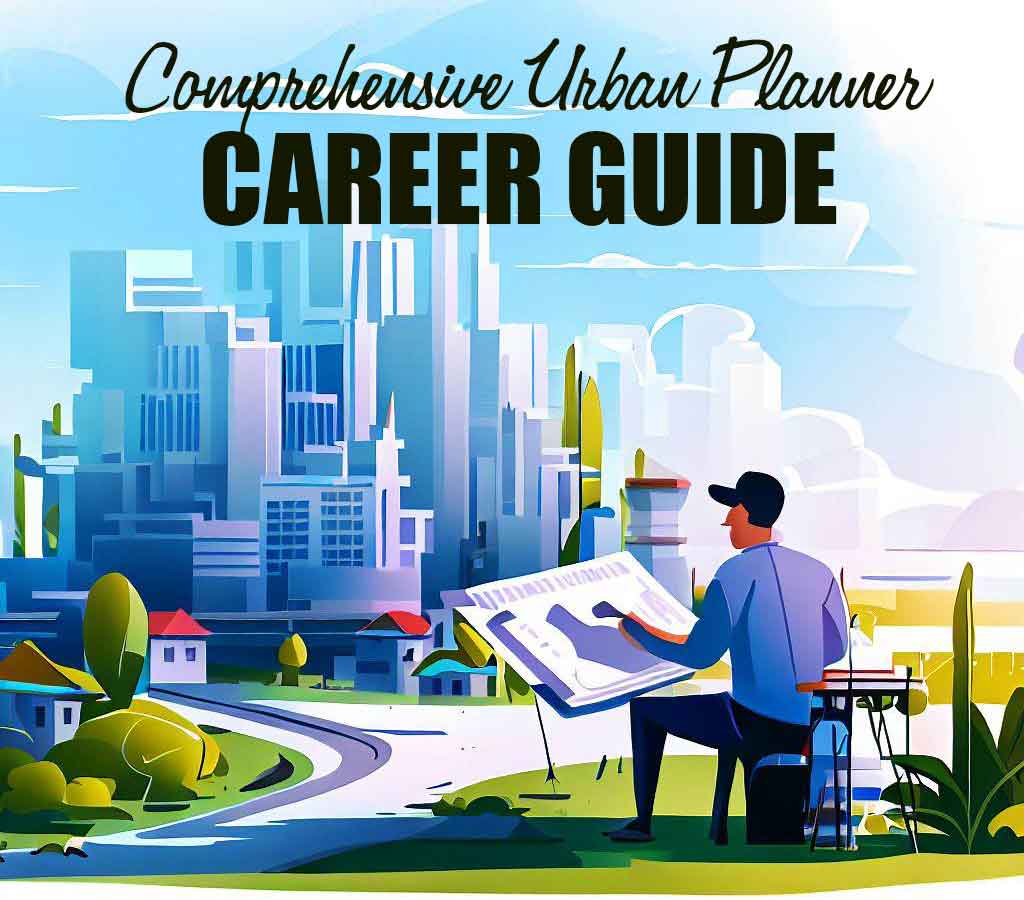 So, you want to become an urban planner! This guide explores the exciting career of urban planning and the many important steps needed to become an urban planner. We will explore education and training, along with navigating the urban planning job market. We will explore the skills needed to for a successful urban planning career. Is an urban planning career right for you? Lets find out more..
So, you want to become an urban planner! This guide explores the exciting career of urban planning and the many important steps needed to become an urban planner. We will explore education and training, along with navigating the urban planning job market. We will explore the skills needed to for a successful urban planning career. Is an urban planning career right for you? Lets find out more..
Urban Planning Career
As an urban planner, your responsibilities encompass conducting research, analyzing data, preparing land use plans, collaborating with stakeholders, and implementing policies that promote sustainable growth. Understanding the scope and significance of urban planning sets the foundation for embarking on a fulfilling career that directly influences society.
Education and Training for Urban Planning Careers
Academic Paths in Urban Planning
Embarking on a career in urban planning starts with obtaining a comprehensive education in the field. There are diverse academic paths available that can pave the way to a successful urban planning career. Let’s explore these paths and the degrees they offer:
- Bachelor’s Degree: A Strong Foundation
A bachelor’s degree serves as the initial stepping stone towards a career in urban planning.
Although your ultimate goal in urban planning education is to obtain a graduate degree, you will, of course, need to begin by getting an undergraduate degree.
It is recommended that your undergraduate degree in urban planning hold accreditation through the Planning Accreditation Board (PAB). Having such accreditation demonstrates that an undergraduate program meets quality standards developed by the Association of Collegiate Schools of Planning (ACSP), the American Planning Association (APA), and APA’s American Institute of Certified Planners (AICP).
- Master’s Degree: Specialization and Advanced Skills
A master’s degree in urban planning offers a deeper level of specialization and advanced skills necessary for tackling complex urban challenges. This graduate program delves into various aspects of urban planning, allowing you to specialize in areas such as urban design, housing, transportation, or environmental planning. Through coursework, research projects, and internships, you’ll develop a comprehensive understanding of the practical applications of urban planning theories. Additionally, the master’s program provides opportunities to engage with industry professionals and gain hands-on experience in real-world planning scenarios.
- Ph.D. Degree: Research and Academia
By choosing the appropriate academic path, you can lay a strong foundation for your urban planning career. Each degree level offers distinct advantages, allowing you to progressively acquire the knowledge, skills, and expertise needed to excel in the field. Whether you aim to contribute to sustainable development, shape urban policies, or enhance community livability, the academic paths in urban planning provide the necessary tools to make a meaningful impact.
Relevant Fields of Study
Urban planning draws knowledge and principles from multiple disciplines. Pursuing studies in urban design and architecture, environmental planning and sustainability, transportation planning, or economic development and policy can deepen your understanding of urban planning and enhance your professional capabilities.
The Significance of Internships and Real-World Experience
When it comes to forging a successful path in urban planning, the value of practical experience cannot be overstated. Internships provide a unique opportunity for aspiring urban planners to bridge the gap between theoretical knowledge and real-world application. They offer a platform to cultivate essential skills, foster personal growth, and establish valuable professional connections. Here’s why internships hold immense importance in the field of urban planning:
- Applying Theoretical Knowledge in Real-World Settings
Internships enable you to go beyond the confines of the classroom and immerse yourself in the practical realities of urban planning. It is during these internships that you can witness firsthand how theories and concepts translate into tangible outcomes. By actively engaging in real-world projects, you can refine your problem-solving abilities, enhance your understanding of local contexts, and adapt your knowledge to varying urban environments.
- Developing Critical Skills and Competencies
In order to succeed as an urban planner, you should possess the following skills:
- Organization
- Decision making
- Attention to detail
- Communication (oral and written)
- Negotiation
- Problem-solving
- Research
- Analysis
- Motivation of others (and self-motivation)
- Information technology
- Interpersonal
- Building a Professional Network
An internship in urban planning is an important part of your graduate coursework. You will get the opportunity to work in a real-world setting, applying what you have learned in the classroom to practical use. Examples of employers nationwide that have hosted college interns are many and include:
- City of Los Angeles Planning Department
- Wallace, Roberts & Todd, LLC – Philadelphia
- Maryland National Capitol Park & Planning Commission
- World Resources Institute, Washington, D.C.
- NoHo Business Improvement District, New York City
- AECOM, Dallas
- Chicago Metropolis 2020
Remember, the knowledge and skills gained through internships will not only bolster your resume but also provide you with a deeper appreciation for the realities and complexities of the urban planning profession. Embrace the transformative power of internships as you embark on your journey toward building a successful career in urban planning.

Navigating the Urban Planning Job Market
The American Institute of Certified Planners (AICP) has listed some of the most popular urban planning job titles and descriptions for those jobs.
- Planning Director/Senior Level Planner
- Principal Planner/Planner IV
- Planner III/Senior Planner
- Planner II/Associate or Junior Planner
- Planner I/Assistant Planner
- Planning Technician
Exploring Job Opportunities in Urban Planning
Urban planners can go by many names and titles, including (but not limited to):
- Urban planners
- Regional planners
- Community planners
- City planners
- Sustainability planners
- Transportation planners
- Climate action planners
- Capital planners
- Strategic planners
- GIS planner
- Public Policy
- Real Estate
Urban Planning Job Boards and Online Resources
Job boards and online resources are valuable tools for finding urban planning job openings. Platforms like Indeed, LinkedIn, and specialized urban planning job boards aggregate job opportunities across different sectors and locations. Regularly monitoring these platforms, tailoring applications, and leveraging your professional network can maximize your chances of securing a desired position.
Building a Strong Urban Planning Resume
Crafting an effective resume is essential for showcasing your qualifications and experiences to potential employers. Highlight relevant education, internships, and research projects related to urban planning. Emphasize your skills, such as data analysis, proficiency in Geographic Information Systems (GIS), policy development, and community engagement. Tailor your resume to each job application, aligning it with the specific requirements of the position.
Crafting an Effective Cover Letter for Urban Planning Positions
A well-crafted cover letter provides an opportunity to make a strong impression and convey your passion for urban planning. Customize each cover letter to the job you are applying for, demonstrating your understanding of the organization’s values, projects, and goals. Articulate your motivation, relevant experiences, and why you are a good fit for the role.
Interview Preparation for Urban Planning Jobs
Preparation is key to performing well in urban planning job interviews. Research the organization and familiarize yourself with its planning initiatives, policies, and challenges. Practice common interview questions, and develop concise yet comprehensive responses that highlight your knowledge, problem-solving abilities, and dedication to sustainable development.
Developing Skills for a Successful Career in Urban Planning
Analytical and Critical Thinking Skills
Communication and Stakeholder Engagement
Effective communication is vital in urban planning, as you will frequently collaborate with diverse stakeholders, including community members, policymakers, architects, engineers, and developers. Sharpen your communication skills to convey ideas clearly, actively listen to others, and facilitate constructive dialogue. Engaging stakeholders throughout the planning process fosters inclusivity and helps build consensus around proposed initiatives.
Technical Proficiency
Urban planning professionals often work with advanced tools and technologies. Acquiring technical proficiency in areas such as Geographic Information Systems (GIS), data analysis software, visualization tools, and urban modeling software can significantly enhance your efficiency and effectiveness. Stay updated with the latest advancements in urban planning technology to remain competitive in the field.
Problem-Solving and Decision-Making Abilities
Urban planners face complex challenges that require innovative problem-solving and decision-making skills. Developing the ability to assess situations, analyze potential solutions, and make sound decisions under pressure is crucial. Embrace a creative and adaptive mindset to address emerging urban planning issues and contribute to sustainable and resilient cities.
Continuing Professional Development
Urban planning is a field that constantly evolves, necessitating ongoing professional development to stay ahead. Here are ways to continue growing as an urban planning professional:
Professional Associations and Networking
Joining professional associations, such as the American Planning Association (APA) or regional planning associations, provides access to valuable resources, networking opportunities, and industry events. Engage with fellow professionals, attend conferences, and participate in workshops to expand your knowledge, stay informed about industry trends, and foster meaningful connections.
Continuing Education and Certifications
Consider pursuing continuing education courses, certificate programs, or specialized certifications in areas such as sustainable development, transportation planning, or environmental planning. These educational opportunities demonstrate your commitment to professional growth and allow you to acquire specialized knowledge in specific aspects of urban planning. View our guide to getting an urban planning certification.
Stay Informed and Engaged
Keep abreast of current urban planning topics, research findings, and policy changes. Follow reputable urban planning publications, attend webinars, and engage in online forums or discussion groups to stay informed and contribute to meaningful conversations within the profession. Regularly update your knowledge to remain a knowledgeable and informed urban planning practitioner.
In Conclusion
Building a successful career in urban planning is a journey that requires dedication, continuous learning, and a passion for creating sustainable and vibrant cities. By focusing on acquiring the necessary education, developing essential skills, navigating the job market strategically, and investing in ongoing professional development, you can position yourself for a rewarding and impactful career in urban planning. Embrace the challenges, embrace innovation, and contribute to the betterment of communities through thoughtful and effective urban planning practices.


